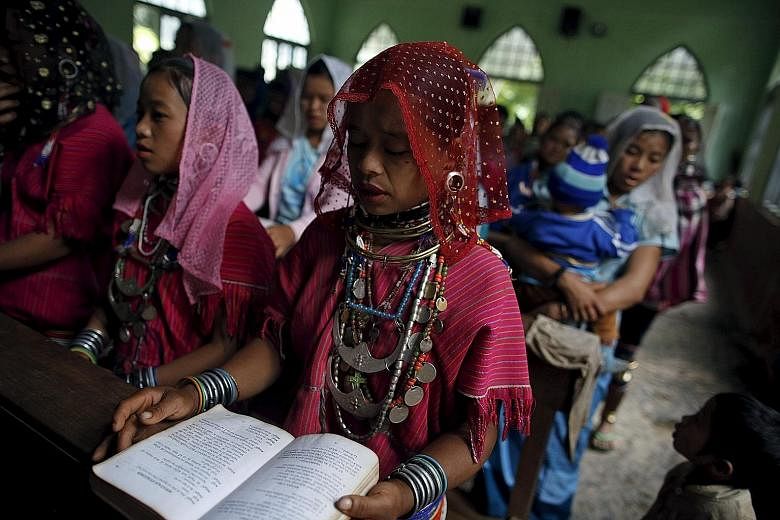Dr Tu Ja, 69, did not share the enthusiasm of the crowds flocking to see opposition National League for Democracy (NLD) leader Aung San Suu Kyi at the edge of Myitkyina in northern Myanmar's Kachin state.
The retired dental surgeon, once with the Kachin Independence Organisation (KIO) which has long fought for autonomy from Myanmar's iron-fisted military regime, put his faith in the country's new open political space by founding the Kachin State Democracy Party (KSDP) in 2013.
The KSDP and four other ethnic Kachin parties face a moment of truth as the NLD juggernaut comes to town in a bid to lure the ethnic minority vote.
It will, however, not be easy for the NLD either. Ms Suu Kyi, 70, draws crowds with her charisma, but in some cases she cuts little ice with local politicians long suspicious of Bamar or Burman domination of national politics.
Ms Suu Kyi - the daughter of independence hero and martyr General Aung San - is from the Burman elite.
The NLD is fielding some ethnic minority candidates but loyalty to local parties may yet override Ms Suu Kyi's appeal. The ethnic parties hope to win enough seats in the Nov 8 general election to wield real clout as a bloc in Parliament.
Dr Tu Ja, in an interview in his modest office in Myitkyina, said: "We do welcome Daw Aung San Suu Kyi. But we don't want to allow her to take all the seats in Kachin state. It is not just the Kachin who feel like this; all the ethnic nationalities like the Shan, the Arakanese, the Chin and the Mon have this view."
Mr Saw Than Myint, an ethnic Shan and co-founder of the Federal Union Party (FUP), which aims to represent the interests of all of Myanmar's minority groups, said: "The NLD and our party are strangers... We do not support the NLD and USDP; we will only work together with our allied ethnic parties."
Over the weekend on the other side of the country of 50 million, by the Bay of Bengal in violence-torn Rakhine state, Ms Suu Kyi made a plea for tolerance between Buddhists and Muslims.
"All citizens in the union need to unite... great hatred and fear does not benefit our country," she said. "It is very important that all people - regardless of race and religion - living in our country must be safe."
The message may get her the Muslim vote there. But the predominantly Buddhist Rakhines, who also have little love for the Bamar, see the NLD as appeasing Muslims, and are unlikely to vote for it.
Myanmar is a complex patchwork of ethnic identities, but dominated by the Bamar or Burman group. Other ethnic identities such as the Kachin, the Karen and Arakanese have historically been de facto nation states, united only under a strong Burman kingdom - and then held together under colonial rule.
But fault lines cracked soon after independence in 1948. Civil wars began, killing thousands and leaving many parts of Myanmar's periphery underdeveloped for decades.
"Inequitable distribution of political and economic rights has long driven mistrust and conflict in Myanmar," the Transnational Institute (TNI) said in a September briefing paper on ethnic politics.
Despite her nationwide appeal, Ms Suu Kyi may not be above Myanmar's ethnic divisions.
Non-Burmans, who constitute an estimated third of the population, still need to be convinced that parliamentary politics are the route to achieving their aspirations, the TNI paper noted. More than half of the 91 political parties that registered for the Nov 8 poll represent ethnic or religious minorities.
Pundits do expect the NLD to win most of the 75 per cent of Parliament seats up for grabs - the army has a lock on the remaining 25 per cent - but few are willing to bet on outcomes.
The ethnic minority vote, emerging after years of suppression, is an unknown quantity. But its leaders intend to make an impact and are hoping for a pivotal role in Parliament. "No one can form a government without cooperating with our ethnic parties. Not even the NLD," Mr Saw Than Myint said.

